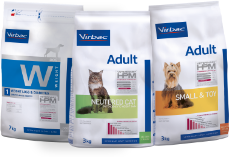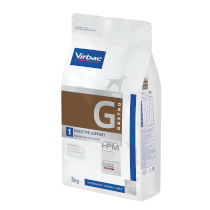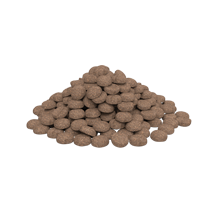DIGESTIVE Support Dog Food
Sağlığa yararları
- Sindirim sisteminin ihtiyacının sınırlandırır (yüksek enerji yoğunluğu ve yüksek sindirilebilirlik)
- Sindirim bağışıklığı (Digest Plus Kompleks: kil, probiyotikler, prebiyotikler, lifler, butirat ve nükleotidler)
- Besin alımının idamesi (yüksek iştah: hayvansal proteinler ve yağlar)
- Gıda alerjenlerinin sayısını sınırlar (sığır eti, glüten, mısır, buğday, soya, yumurta, balık, süt ürünleri içermez)
- Kayıpların telafisi (yüksek enerji yoğunluğu ve artan su tüketimi : protein ve sodyum)
Mevcut ambalajlar:
- 3 kg
- 12 kg
Köpekler ve kediler, sağlık durumlarına bakılmaksızın etoburdur. VETERİNER HPM Klinik Mamalar, proteinin% 90'ı hayvansal kaynaklı olan, yüksek proteinli ve düşük karbonhidratlı (HP-LC) bir formülasyona dayanmaktadır.
Kurutulmuş domuz ve kümes hayvanı proteinleri*, pirinç*, hayvansal yağlar, lignoselüloz, hidrolize domuz ve kümes hayvanı proteinleri*, pancar küspesi, mineraller, balık yağı*, keten tohumu, bira mayası (betaglukan ve nükleotit kaynağı), pisilyum lifi (Plantago (L. ) spp.), frukto-oligosakkaritler, kalsiyum butirat, Lactobacillus acidophilus.
* Sindirilebilirliği yüksek bileşenler
VETERINARY HPM® hiçbir suni tatlandırıcı veya renklendirici içermez.
| Analytical Constituents (% as fed) |
|
|---|---|
| Moisture | 9 % |
| Protein | 34 % |
| Animal to vegetal protein ratio | 92/08 |
| Fat | 22 % |
| Minerals | 7,5 % |
| Crude Fibre | 6 % |
| Total dietary fibre | 10,5 % |
| NFE * | 21,5 % |
| Starch | 17 % |
| Calcium | 1,3 % |
| Phosphorus | 0,9 % |
| Sodium | 0,6 % |
| Potassium | 0,8 % |
| Omega-6 | 2,5 % |
| Omega-3 | 0,9 % |
| ME** calculated | 384 kcal/100g |
| ME** measured in vivo | 411 kcal/100g |
| * Nitrogen Free Extract: carbohydrate ** Metbolisable energy |
|
| Functional Ingredients | |
|---|---|
| Bentonite | 5g/kg |
| Killed Lactobacilli | 7 mg/kg |
| Butyrate | 430 mg/kg |
| Nucleotides | 560 mg/kg |
| Beta Glucan | 500 mg/kg |
| Added Vitamins & trace elements | |
|---|---|
| Vitamin A | 12 600 IU/kg |
| Vitamin D3 | 1 100 IU/kg |
| Vitamin E | 570 mg/kg |
| Vitamin B1 | 3,8 mg/kg |
| Vitamin B2 | 11 mg/kg |
| Vitamin B3 | 30 mg/kg |
| Vitamin B5 | 26 mg/kg |
| Vitamin B6 | 3 mg/kg |
| Vitamin B9 | 0,48 mg/kg |
| Vitamin B12 | 0,071 mg/kg |
| Choline | 740 mg/kg |
| Taurine | 1 500 mg/kg |
| Copper | 15 mg/kg |
| Iodine | 1,1 mg/kg |
| Zinc | 140 mg/kg |
Günlük beslenme tablosuna uyulması ve taze içme suyu bulundurulması tavsiye edilir.
| Vücut ağırlığı (kg) |
Günlük beslenme miktarı (g/gün) |
||
|---|---|---|---|
| Fazla kilolu | Normal* |
İyileşme/Düşük kilolu |
|
| 3 | 65 | 85 | 100 |
| 5 | 95 | 120 | 140 |
| 8 | 130 | 160 | 195 |
| 10 | 150 | 185 | 225 |
| 15 | 195 | 245 | 295 |
| 20 | 235 | 295 | 355 |
| 25 | 275 | 345 | 415 |
| 30 | 310 | 390 | 465 |
| 40 | 375 | 470 | 565 |
| 60 | 495 | 615 | 740 |
|
*İdeal vücut ağırlığına ve normal fiziksel aktiviteye sahip yetişkin kedi Günlük beslenme miktarı, kedinin mevcut vücut ağırlığına dayalıdır ve iyileşme döneminde her hafta ve orta/uzun vadede her ay ayarlanmalıdır. |
|||

- Yavru köpeğimi ev yemeği ile besleyebilir miyim?
Yavru köpeklerin ilk yılları boyunca aldıkları besinlerin iskelet, kas ve tüm yeni dokuları oluşturmak için enerji ve madde sağlaması gerektiği açıktır. Ancak beslenme bununla sınırlı değildir: yavru köpeklerin tam olarak işleyen bir sinir sistemi ve etkili bir bağışıklık sistemi geliştirmelerine de yardımcı olmalıdır. Bu çok hassas dönemde temel besin maddelerinde (hayvanın vücudu tarafından sentezlenemeyenler) herhangi bir eksiklik, köpeğin gelecekteki sağlığını etkileyebilir.
Yavru köpekleri için beslenme açısından dengeli bir ev yemeği hazırlamak isteyen köpek sahipleri için veteriner hekim beslenme uzmanları tarafından geliştirilen birçok tarif mevcuttur. Bununla birlikte, gerekli tüm koşullara uymayı başarmak yanıltıcıdır; çünkü ev tipi bir rasyonun besin dengesi çeşitli tehlikelere tabidir. Sahibi her zaman tarifi tam olarak takip etmekte zorlanacaktır, gerekli malzemeler her zaman mevcut değildir ve malzemelerin besin bileşimi ürünün kaynağına bağlı olarak önemli ölçüde değişebilir. Ev yemeği hazırlarken hiçbir laboratuvar analizi, kullanılan hammaddelerin besin bileşimini doğrulayamaz!
Bu nedenle, bir mineral ve vitamin takviyesi ile birlikte olsa bile, köpekler için ev yapımı yemekler genellikle bazı temel besin maddeleri açısından eksiklikler gösterir.
- Yavru köpeğimi vejetaryen bir diyetle besleyebilir miyim?
Köpek bir etoburdur, bu da ihtiyaç duyduğu bazı besinlerin bitki bazlı bir diyetle sağlanamayacağı anlamına gelir. Bu tür diyetler, sağlık üzerinde ciddi sonuçları olan büyük beslenme eksikliklerine neden olabilir. Bu nedenle, yavru bir köpek asla vejetaryen bir diyetle beslenmemelidir.
- Yavru köpeğimi çiğ et ile besleyebilir miyim?
Çiğ et (kırmızı et veya tavuk) genellikle kalsiyum ve fosfor açısından yetersizdir. Kalsiyum/Fosfor oranı, özellikle kemik büyümesi açısından köpek türleri için tamamen uygunsuzdur. Böyle bir diyet, sağlık üzerinde ciddi sonuçları olan önemli beslenme eksikliklerine neden olabilir. Yavru köpek, yalnızca çiğ etle beslendiğinde küçük travmalarda bile patolojik kırık riskine maruz kalabilir.



